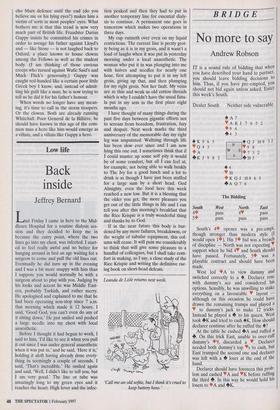BRIDGE
No more to say Andrew Robson
IT is a sound rule of bidding that when you have described your hand to partner, you should leave bidding decisions to him. Thus, if you have pre-empted, you should not bid again unless asked. Enter this week's South.
Dealer South Neither side vulnerable 4A7 VA K J 7 6 5 2 • 9 4 4 3 4 K 9 6 5 4 Q J 108 32
N
Q 4 3 9 8 • A
W E
• 7 3 2 # K J 9 8
2
# 10 5 44 10 • K Q J 108 6 5 # A Q 7 6 The Bidding South West North East 4• pass 4V pass 5♦ pass pass pass South's 44 opener was a pre-empt, though stronger than modern style (I would open 1•). His 5* bid was a breach of discipline — North was not expecting support when he bid 4V and South should have passed. Fortunately, 5♦ was a playable contract and should have been made.
West led ♦A to view dummy and switched correctly to a 4. Declarer rose with dummy's ace and considered his options. Sensibly, he was unwilling to stake everything on a favourable ♦ layout although on this occasion he could have drawn the remaining trumps and played a to dummy's jack to make 12 tricks. Instead he played a 4 to his queen. West took 4K and tried to cash 4K. How should declarer continue after he ruffed the 4?
At the table he cashed *A and ruffed a 4. On this trick East, unable to over-ruff dummy's 49, discarded a V. Declarer needed both dummy's top Vs to cash, but East trumped the second one and declarer was left with a + loser at the end of the hand.
Declarer should have foreseen this prob- lem and cashed •A and VK before ruff-lug the third 4. In this way he would hold his losers to ♦A and 4K.


























































 Previous page
Previous page